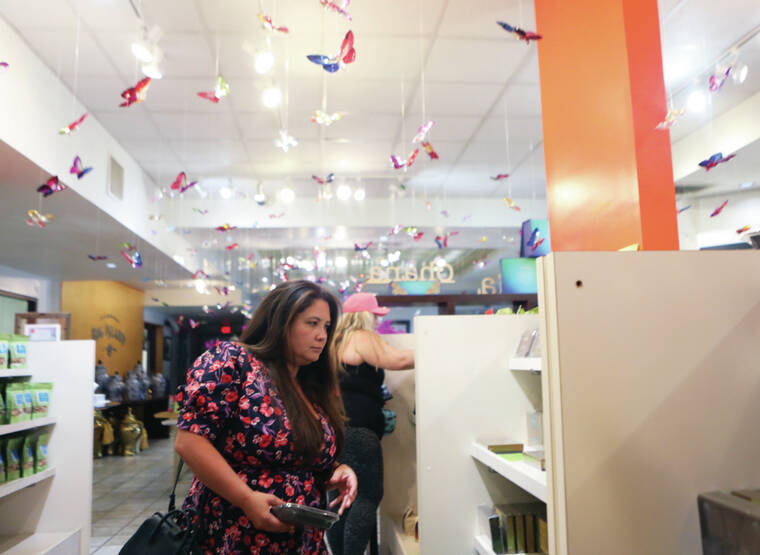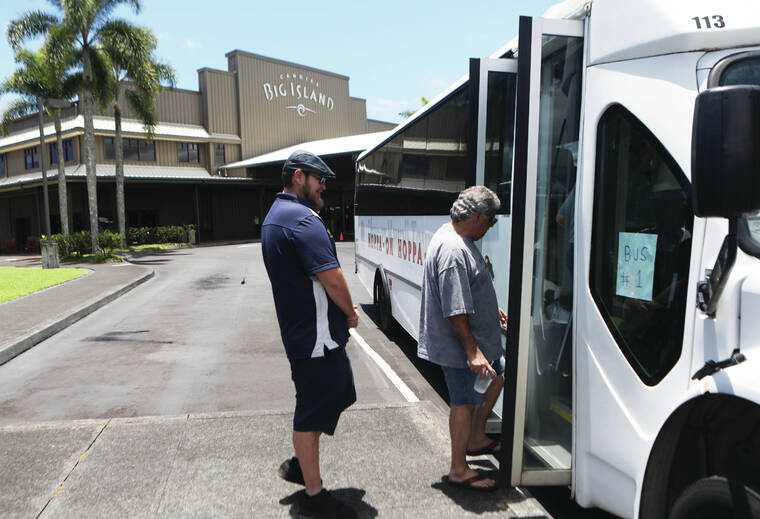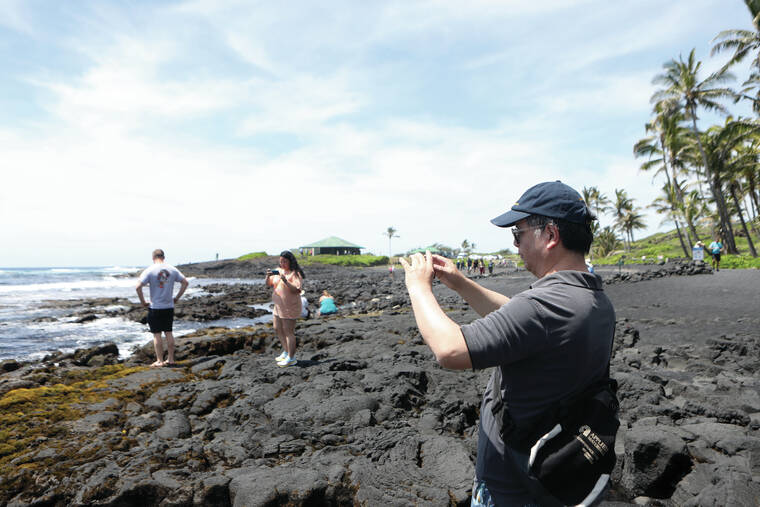Report: Hawaii likely to avoid mild downturn that is expected to hit mainland

FULEKY

Kelsey Walling/Tribune-Herald Shoppers look for gifts available at Big Island Candies in Hilo on Thursday, May 11, 2023.

Kelsey Walling/Tribune-Herald Tourists load up on a Hoppa-On Hoppa-Off bus during a trip to Big Island Candies in Hilo on Thursday, May 11, 2023.

Kelsey Walling/Tribune-Herald Visitors take photos and walk around Punaluu Beach in Ka'u on Wednesday, April 26, 2023.

Kelsey Walling/Tribune-Herald Visitors on Thursday look at the goodies available at Big Island Candies in Hilo. The tourism industry, along with the construction industry, could help Hawaii avoid a recession, according to an economic report released today.
Economists at the University of Hawaii Economic Research Organization are predicting a mild recession for the continental U.S. later this year, but think that Hawaii — while affected — will keep its economic head above recessionary water.
Economists at the University of Hawaii Economic Research Organization are predicting a mild recession for the continental U.S. later this year, but think that Hawaii — while affected — will keep its economic head above recessionary water.
That’s the finding of UHERO’s second-quarter forecast for 2023, titled “Promise and Peril for the Hawaii Economy.”
ADVERTISING
Tourism prospects are positive, despite the delayed Japanese market recovery, the study notes. It also predicts that construction activity statewide will remain high, and with inflation receding, the stage is set for gains in real income.
March tourism numbers provided by the Hawaii Tourism Authority showed 900,800 visitor arrivals, 97% of the visitor arrivals in March 2019, the benchmark year prior to the novel coronavirus pandemic.
“It is U.S. visitors that have helped us get out of the pandemic, and we have also seen a fairly solid return of international visitors, Canadians and other inter-Pacific visitors, except Japanese visitors,” said economist Peter Fuleky, one of the report’s authors, during a press conference Thursday. “The Japanese visitors expressed some reluctance to travel.”
Fuleky was referring to a December 2022 international study by the global intelligence company Morning Consult that found 35% of Japanese respondents said they won’t travel again — ever.
“It goes beyond the fact that the yen is weak and the travel costs are high. It is the general reluctance of the public,” Fuleky said. “There are several issues in Japan. Japan has an aging population. And the population, in fact, is shrinking. So Hawaii used to be a honeymoon and wedding place for Japanese travelers. There’s fewer people getting married in Japan; there’s fewer people who honeymoon. There’s just a smaller population of people who would come to Hawaii. All these things are, so to speak, longer-term issues that Hawaii will face in the coming decades.
“Right now, we’re at … just above a quarter of what we’ve seen before the pandemic. So there’s still room to improve. And we do expect continual improvement. But even at the end of the five-year forecast horizon, we don’t expect to reach the level of Japanese visitors we had seen before the pandemic.”
South Korea had the second-highest percentage of those among 15 countries surveyed expressing no desire to travel again, at 15%.
Visitors to Hawaii spent $1.94 billion in March, according to the HTA, a 23.4% increase over the $1.49 billion visitor spending in March 2019.
“Part of that can be attributed to the high room rates. The room rates have risen, especially early in the pandemic recovery, faster than inflation … and that lifted visitor spending in general,” Fuleky said. “Of course, the visitors are spending more on other services and goods when they come here.”
Another factor that should be in the state’s favor, according to the report, is the recovery of the labor market after pandemic shutdowns.
“Labor force participation rates are really close to what they were before the pandemic. The unemployment rate is also very low at 3.1%. This all looks good,” Fuleky said. “The one caveat in here is that we have seen … an out-migration from the state. And effectively, the number of people who can work, apparently, is fewer than it was before the pandemic.”
A third strength in the state’s economy, according to the report, is the construction industry, which Fuleky called “one of the bright spots, overall.”
“It has performed quite well despite the fact that we are seeing high interest rates,” he said. “The labor market within the construction industry has now fully recovered. The number of jobs is above the level that we have seen before the pandemic and going forward, construction is going to be helped by large government projects.
“The residential side of construction has been more sluggish. Obviously, mortgages play a role in this. We are also permitting fewer homes than in the past, and the low permitting numbers are not helping affordability, either.”
The higher interest rates — which include mortgages, car loans, personal loans and credit cards — are spurred by the 5.08% charged to banks by the Federal Reserve. The Fed has raised interest rates 10 times in a little over the past year to curb the inflation that’s resulted in higher consumer prices.
The state’s current inflation rate is 3.1%, well below the nation’s 4.93%, and the state’s inflation rate is receding more rapidly than the U.S. rate, which the report said will support gains in real income in Hawaii.
“Inflation, Fed rate hikes, bank failures and debt ceiling — these are the main national and global events that we analyze in our report and that play an important role in the last couple of months and will play a role in the coming months,” Fuleky said.
There have been a number of highly publicized bank failures in the past few months, especially in banks that specialize in the tech sector. And there’s been a stalemate between President Joe Biden, who wants to raise the nation’s debt ceiling to keep the government out of default, and congressional Republicans, who have resisted the requested hike.
“Hawaii is a state that has many federal employees. So a debt ceiling delay … might cause additional problems in Hawaii,” Fuleky said.
Fuleky disagreed with the assessment of Hawaii economist Paul Brewbaker, who said in a livestreamed interview a month ago that the state is in a recession, pointing to a falling gross domestic product as the main culprit.
“The volatile industries like tourism and construction are doing either well or improving — and then we have the stable industries (such as government) that haven’t yet been hit by, for example, the debt ceiling problems,” Fuleky said.
“I don’t think we are currently in a recession.”
Email John Burnett at jburnett@hawaiitribune-herald.com.


